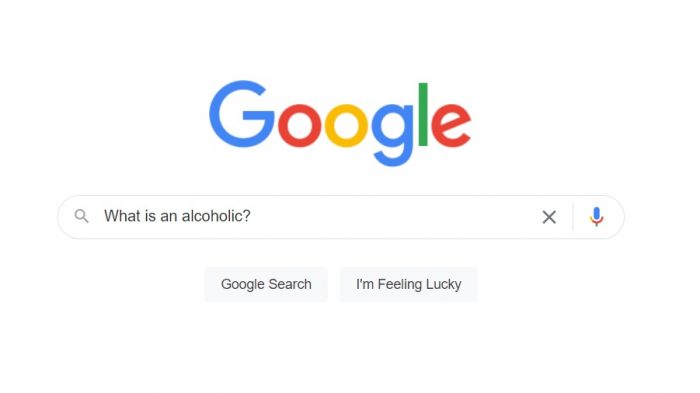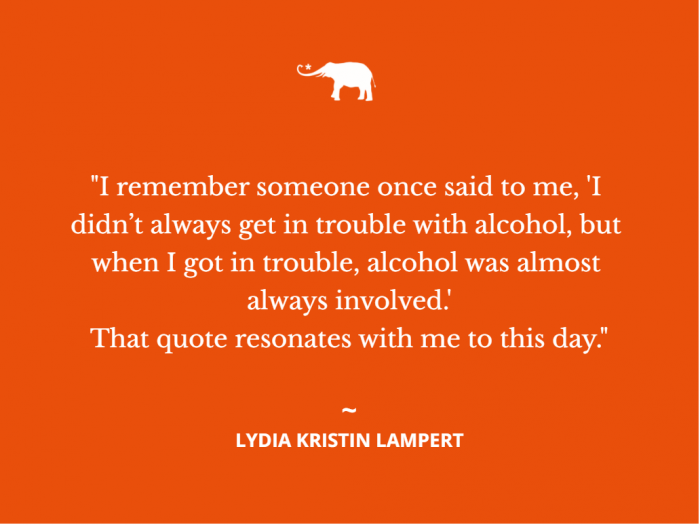What image comes to your mind when you think of an alcoholic?
I decided to do a Google search for “images of alcoholics” and was surprised when the first 12 were men, and out of 35 images, only 5 of them were females!
Not only that, but the pictures consisted of men drinking alone in dark places on the streets and looking desolate. The female images included three who were drinking in the bedroom, one was in a bar, and one was in the kitchen with her child.
Canned images that fill society with mistruths about alcoholism—aka alcohol abuse or alcohol misuse disorder—must be dispelled, and here’s why.
Today, in the midst of a conversation with a friend over medications for depression, I was telling her I stopped taking mine because I realized that the glass or two of wine I was having each day was likely negating my antidepressant. I explained that once I stopped drinking wine, I felt better because the anxiety was gone. I can’t quite remember what was said after, but there was somewhat of an awkward pause, so I said, “Did you think I was inebriated every night of the week?” and kind of laughed.
I never expected her to say yes.
It had never occurred to me that as I publicly shared my stories and was honest about my struggles with alcohol and my ultimate decision to stop drinking wine, people created their own idea as to what I was like before I decided to become sober.
I should have known better.
I read tons of Quit Lit when I first threw away the wine. I learned how society conditions us all when it comes to alcohol and how it begins shaping us at a young age to believe we need it to have fun, to socialize, to be sophisticated, yadda, yadda, yadda.
The conversation I had with my friend rented space in my head all day. It got me thinking hard about the idea of alcoholics, sobriety, and what this society even really understands about it. I’ve never been one to fit into a category or definition, and I’m okay with that.
Here’s what I do know about myself when I used to drink wine:
>> I did not like to drink anything else, and I didn’t.
>> I did not drink every day, but I drank most days.
>> I could stop at one glass of wine when I wanted to—key word…wanted.
>> I did not get drunk every time I drank; most times, I did not get intoxicated.
>> I did look forward to my glasses of wine each night.
>> I loved the taste of red wine; I still do, but what I love more is having a healthy mind.
>> Wine gave me a temporary lift or feeling of happiness, which I later realized was dopamine, but then I would crash.
>> I got up every day and went to work at a job where I was successful.
“But there was something that made you stop,” you say.
And to that I say, “You are right. There were two things.”
Anticipated risk.
I work with high-risk patients and see alcoholism and its damaging effects on a person’s body and mind over time. Cirrhosis of the liver is a horrid condition. I have seen several patients pass away due to complications of alcoholism, and it scared me.
You see, I had too many similarities to my patients when it came to childhood trauma, depression, and anxiety. I related to their pain and knew that although I may not have crossed that line to physical addiction, I flirted with it, and based on my personal psychiatric history, had a high propensity for crossing it someday.
Inability to moderate.
Drinking and partying with my friends has always been an issue for me. I hate for the party to end, hence, my Instagram handle @nomoderationmoma. When I was amongst friends, one glass would lead to two, then three, then a bottle, then another bottle, all under the guise of “having fun.” I had these “fun” times two or three times a year.
Harmless, right? Sure, but on March 7, 2021, I scared myself and my family. The following day, I realized I never wanted to take a chance with my life again while having “fun,” so I stopped drinking altogether. I’ve had friends tell me it doesn’t have to be forever, to which I say yes it does. I am not willing to take that chance again, and I am totally okay with the decision. I’ll struggle to moderate my laughter and joy nowadays, thank you very much.
Getting back to the issue at hand, though, why do people immediately conjure up a certain image when it comes to drinking? I wonder, do I have an image in my head? I don’t think I do, but when I try to delve deeper, it brings about a question within me that makes me wonder.
For instance, why am I even writing this? Am I trying to justify something? Make myself feel better? I hope not. And if I was, again, I would curse the stigma and the ingrained desire to avoid it as society has conditioned us to do.
I suspect humans like comparisons in an effort to make themselves less guilty or self-conscious, myself included. I think these canned images on Google, these preconceived notions of an alcoholic or someone who struggles with alcohol or inability to moderate is so far-fetched.
They make 90 percent of people who question their own relationship with alcohol feel better. If they look at a picture like that of the gentleman sleeping on a concrete slab with an empty bottle spilled over, they think they are okay.
But are they, really? And if they aren’t, who would tell them they’re not? How would they know? Who would they approach to even discuss the concern?
Sadly, I also believe stigmas are perpetuated within the medical community.
I remember being told in nursing school that should a patient admit to drinking two or three beers a night, you should double or triple that.
I carried that with me throughout my career, and now I realize that is a massive barrier to anyone who may be at risk, for as soon a person goes in to speak to a nurse or doctor and says, “Yes, I have one or two glasses of wine at night,” that number is doubled or tripled by the assessor, and stigmatization immediately takes place.
How many people continue to drink because they fear being stigmatized by their doctors, peers, and support system? There has got to be a better way to determine if alcohol has had a negative impact on your life in an earlier stage before it truly gets its clutches into you.
Once I stopped partaking, I realized that, maybe, some of these little tiny warnings may help you reevaluate your relationship with alcohol or anything else that may be distracting you from living a beautiful, fulfilling life:
>> I no longer have to remember which wine store I went to last since I was on a constant mission to avoid being deemed a “regular.”
>> I no longer worry, before going on a trip, about whether I should bring a bottle of wine for the room.
>> Family time is genuine and uninterrupted now that I don’t have to refill a wine glass halfway through a movie or game night.
>> My husband and I go to bed together again now that I no longer have a glass of wine to finish. (I never could gulp it down, and I wasn’t going to waste it.)
>> I dine out anywhere now because I’m not worried about a wine list! (Psst—I was missing out on a ton of great restaurants!)
These are just a few things that come to mind for me. Remember that alcohol abuse comes in all different shapes and sizes.
I think another great question to ask yourself is: how is alcohol positively contributing to my life?
The wine was not adding anything positive to my life. Even my laughter when I had wine was influenced by the alcohol. In fact, it was doing quite the opposite of contributing positively. It worsened my anxiety and depression, interrupted my sleep, and controlled my thoughts.
No, I did not fit the stereotypical image of society’s idea of someone with an alcohol problem, but I had one.
I remember someone once said to me, “I didn’t always get in trouble with alcohol, but when I got in trouble, alcohol was almost always involved.”
That quote resonates with me to this day.
If you question your relationship with alcohol, reach out and seek help.
Read.
Join the sober communities online. There are programs for everyone now.
Alcohol abuse is a symptom of a bigger problem—personal pain and the desire to avoid it through intoxication.
We may not all be able to relate to every person’s story or come up in Google’s image catalog, but we are all too familiar with the underlying theme.


 Share on bsky
Share on bsky






Read 14 comments and reply